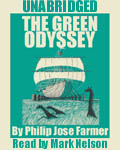
 The Green Odyssey
The Green Odyssey
By Philip Jose Farmer; Read by Mark Nelson
10 MP3s or 10 OGG Vorbis files – 6 Hours 6 Minutes [UNABRIDGED]
Published: December 2006
Publisher: LibriVox.org
Themes: / Science Fiction / Space Opera / Planetary Romance / Swashbuckling / Pirates / Slaves / Planetary Ecology / Panspermia / Humor /
Alan Green is a space traveler stranded on a barbaric planet. He’s been taken as a slave and made a consort to an insipid and smelly queen. His slave-wife, though beautiful and smart, nags him constantly. He’s given up hope of ever returning to Earth when he hears of two astronauts who have been captured in a kingdom on the other side of the planet, and sets out on an action-packed journey on a ship sailing across vast grasslands on rolling pin-like wheels in a desperate scheme to save them and return home.
This audiobook was created on a dare. Back in November 2006 I challenged anyone to make an unabridged single-voiced audiobook from a list of titles of public domain Speculative Fiction novels that had not been previously released as audiobooks. This is the first audiobook to complete the aforementioned “SFFaudio challenge.” With its completion, the narrator, has won himself a copy of Galactic Pot Healer by Philip K. Dick as read by Tom Parker. Congratulations Mark! Now, on to the review proper…
The Green Odyssey roughly parallels the adventures of the original Odysseus, except that the Mediterranean sea here is instead a sea of grass on an endless plain on an obscure alien planet. Perhaps most original in this tale are the ships that sail that grass sea of this land-dominated planet. The idea of sails and roller ships to ply the prairie between cities is a neat one (something similar was used the Dragonlance AD&D module Dragons Of Ice by Douglas Niles). The lead character, Alan Green, is a Earthman who has been shipwrecked (or is that “spacewrecked”) on a planet inhabited by a branch of quasi-medieval Homo sapiens sapiens. If his alien origins were to be revealed they’d think him a demon. For two years already he’s been enslaved and humbled. The worst of it is his being forced into the bed of a lusty, but fickle, Duchess. Her merest whim would mean his death, so when Green hears of two strangers, like himself, who’ve come from the sky in a strange ship, his ears perk-up. Upon further investigation it seems the two “demons” are being held in a distant city. With a death sentence not too far in their futures, Green hatches a shrewd escape plan with a wily merchant. His only problem – his adopted family wants to go with!
This is a exuberant adventure. It reminds me of vintage Poul Anderson, in fact the whole novel is a kind of an inverse of Anderson’s excellent The High Crusade. Its also funny, in the same smile and smirk way, and lets not forget another of its vitures, The Green Odyssey is quick! I often think this, the classic short novel of the 1950s and 1960s, is the perfect length for SF. Moreover, Farmer has scripted lots of fun details for fans of both Robert E. Howard and Edgar Rice Burroughs – the colloquial language is also full realized and amusing. Now a word of caution, this is by no means a classic on the scale of To Your Scattered Bodies Go, Jose Farmer’s best know work. That said, it is absolutely and addictively listenable – I plowed straight through the 6 hour running time with nary a dry spell. Since it is FREE, thanks to the good efforts of Mark Nelson, I can unreservedly recommend it even to people who’d otherwise give it a miss.
Mark Nelson has a real narrators voice. He puts as much characterization into the various characters into this exposition heavy novel as is probably possible. Sound is good, loud enough and pretty clean of noise. Two minor problems, Mark pronounces a word wrong and there is one line repeated, I’d guess the latter got missed in the editing, the former is almost inevitable. I’ve heard professional productions far less “professionally” produced. I am looking forward to hearing a lot more public domain SF novels from Mark!
Editors note:
In a last minute email Mark has said that he does indeed expect to be reading more Science Fiction for LibriVox in the months ahead. He’d prefer titles that “haven’t been done commercially, just to increase the variety of audiobooks out there”. But here’s the problem he’s having; Mark is not super-familiar with the Science Fiction from the 50’s and 60’s. His reading thus far has tended to read much more recent. And so he asks that we come up with with some recommendations. Recommendations, in fact, from what he calls “the knowledgeable” – Hey! That’s you guys out there! So, which public domain Science Fiction novels from the 1950s and early 1960s would you like to hear Mark read?
Posted by Jesse Willis





